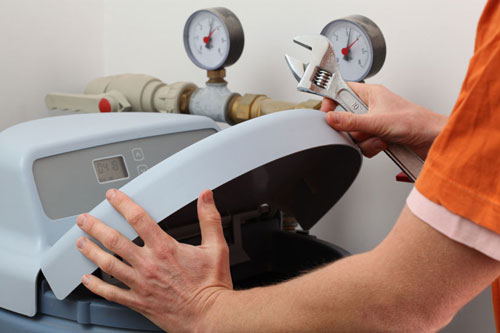Water softeners can solve a multitude of complex issues that can occur with your home water supply. If you aren’t familiar with the differences between hard and soft water, hard water contains a build-up of minerals like calcium and magnesium. This might not sound like much of a concern, but over time it can cause a wide range of costly problems. Soft water, on the other hand, won’t cause any damage to your supply, piping or the appliances in your home. When hard water becomes a nuisance, many homeowners seek out effective water solutions.
What Does a Water Softener Do?
First, you may be wondering what exactly water softeners accomplish. Ultimately, they can improve your home water supply in a number of ways. Water softeners work to:
- Lower water heating costs
- Extend the lifespan of your appliances
- Save you money on soaps, detergents and cleaners
- Brighten the appearance of your clothes
- Provide you with smooth skin and healthy hair
- Remove unwanted soap scum and water spots
How Does a Water Softener Work?
So, how does a water softener do its job? While salt is a major part of the process, salinity doesn’t actually soften your water supply. Miniscule resin beads in your water softener’s tank actually filter the hard water minerals. Salt then washes the beads during the regeneration process, which helps the system function repeatedly. The softening process is relatively complex, but from a distance it might be difficult to tell what’s taking place inside the tank. This system softens your water in three steps:
-
Installation
Once your water softener is installed by a team of experienced specialists, hard water begins to enter the softener from a main pipe or well.
-
Hard Water Minerals Captured
Resin beads then grab ahold of the hard water minerals present in your supply. Once the minerals such as calcium and magnesium are removed, softened water leaves the tank and enters your home plumbing pipeline.
-
Regeneration
Eventually, the minerals collected in the resin beads will need to be removed so the softener can continue operating. This is where the regeneration cycle comes into play. Here, a salty brine is added to the machine. This solution cleans the beads, replacing the minerals with sodium in the process. Next, the brine flows out of the softener and drains the hard water components. From that point, the beads are ready to soak up new minerals.
The regeneration cycle usually takes about two hours, and water should not be used during this time.

Signs You Need a Water Softener
Are you wondering if it’s time to install a water softener? If you’re experiencing any of the following issues, you should give your local water experts a call. You could also visit our water solution center for immediate recommendations.
- Scale build-up on pipes and faucets. Take a glance at your sinks and shower faucets. Calcium and magnesium deposits may be visible. They may appear somewhat chalky. If you start noticing this on a frequent basis, it may be time to acquire a water softener. However, your local water specialists will be able to take an in-depth look to determine your exact needs.
- Coarse laundry after washing. After doing laundry, you expect your clothes to feel clean and soft to the touch. If your clothes feel somewhat stiff right out of the washer, that could be a sign you need water treatment. Additionally, you may notice that the amount of detergent you’re using is no longer adequate. Fabric softeners can help, but this is similar to putting a band-aid on a large wound. A water softener will solve the problem completely.
- Bad-tasting water. When you go to take a swig of water, does it taste somewhat “off”? It could have a chemical taste or an off-putting smell. While this alone doesn’t necessarily mean you need a water softener, it’s a sign you should always pay attention to. More than likely, some kind of treatment is necessary. Hard water could certainly be the culprit, so it’s worth calling your local professionals.
- Soap doesn’t lather like it used to. With hard water, calcium and magnesium deposits in hard water will seep through your water supply and trigger soap scum. Essentially, you’ll be using extra soap when you bathe, wash dishes, or do laundry.
The Experts at Atlantic Blue Water Center Can Help You Choose the Right Water Softener
Do you need a water softener ASAP? We provide water treatment and water softening solutions for homeowners that want a cleaner water supply and water that is free from hazardous carcinogens that can contribute to increased cancer risk. We’re also focused on providing additional education on water treatment, water quality, and issues associated with water contaminants. Call us at (410) 751-9200 to schedule your in-home water testing appointment today.
